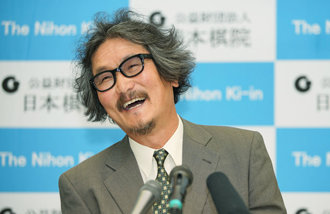Opposition lawmaker`s snub of summons
Prosecutors have summoned Park Jie-won, the floor leader of the main opposition Democratic United Party, to question him on the allegation that he took more than 100 million won (87,600 U.S. dollars) in bribes from Solomon Savings Bank Chairman Lim Seok and Bohae Savings Bank head Oh Moon-seok. Park said he will snub the summons, blasting the investigation a plotted probe. Prosecutors arrested Lee Sang-deuk, former lawmaker of the ruling Saenuri Party and older brother of President Lee Myung-bak, and grilled former Rep. Chung Doo-un, who allegedly colluded with Lee Sang-deuk in an influence-peddling scandal, on the charge of taking 300 million won (263,000 dollars) in bribes from Lim. A subpoena is expected for Kim Hee-jung, President Lees personal secretary who allegedly took money from Lim. Given that prosecutors have arrested the presidents elder brother and are taking presidential aides into custody, summoning the floor leader of the main opposition party can hardly be called a plotted probe.
Lawmakers have no special privilege to prevent a prosecutorial investigation. They are only guaranteed immunity from physical arrest during a parliamentary session. Park apparently intends to continue to reject the summons, and if he sends a bill seeking his arrest to the National Assembly, he will attempt to it voted down. The Democratic United Party assisted in nullifying the top pledge of lawmakers to reform parliament, the cancellation of the immunity-from-arrest privilege at the National Assembly, by strategically adding to votes rejecting a bill on the arrest of former lawmaker Chung. In essence, the party paved the way for rejecting a bill seeking the arrest of the floor leader.
The main opposition party is even moving to hold an assembly session aimed at protecting Park from arrest. The ruling and opposition parties in July agreed to hold a parliamentary inspection into the governments illegal surveillance of citizens in the National Assemblys plenary session, but has yet to form a special committee. By using this as an excuse, the Democratic United Party can call an extraordinary parliamentary session next month. Since such a session can be assembled only with approval from one-fourth of registered lawmakers, the main opposition party can singlehandedly open an extraordinary session. If such a session is convened in August, it will be succeeded by an ordinary plenary session in September, a situation that will effectively transform the Assembly into a parliament meant to protect Park until the presidential election in December.
A probe into bribe-taking or brokering bribes for business favors is launched based on testimony by a person who gave the bribe. Since Lim and Oh have made their testimonies, prosecutors have no choice but to summon and question Park. What Lim told prosecutors on Lee Sang-deuk has been accepted as credible by a court as well. As such, Parks claim that the investigation is politically motivated is unpersuasive at best. If investigators fail in their bid to seek an arrest warrant against him or indict him, a court will reject his arrest warrant or clear him of the charges. Park should not abuse his immunity to physical arrest and should undergo the legal process.
Park said, If I took money, I will cut my belly. If he truly wants to clear the suspicions surrounding him, the right course of action is for him to appear before prosecutors and explain, rather than seeking to defend himself with radical comments and actions. A bill seeking the arrest of Chung was rejected by the National Assembly, but he nonetheless appeared before prosecutors and answered their questions. If Park snubs his summons, the principle of equal under the law will lose its luster.







